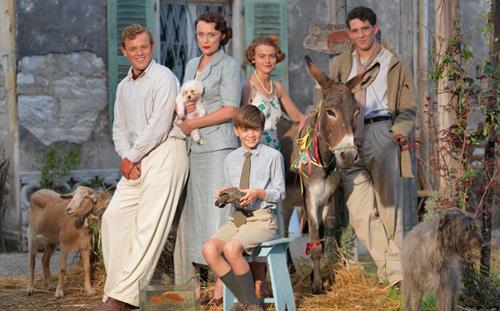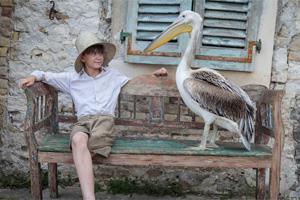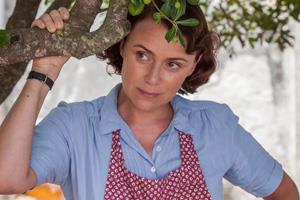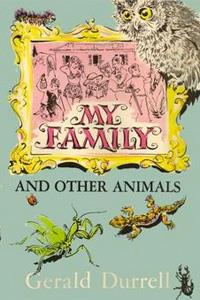
I first read My Family and Other Animals when I was a child. To give you an idea of how long ago that was, naturalist Gerald Durrell’s autobiographical portrait of an English family transported to the Greek island of Corfu in the mid 1930s struck me as a realistic portrait of what it must’ve been like for a young, fatherless family starting a new life far away from home. I laughed in all the right places and, being a bit of an animal lover myself, the idea of a small boy collecting mice, chameleons, turtles, spiders, and lizards, and setting them loose in the family home, seemed perfectly reasonable.
The little boy’s nervous, neurotic older brother, Larry, the oldest son in the family, is a borderline hysteric given to bouts of screaming wildly any time a long-eared hedgehog pokes its whiskers in his face while he’s trying to sleep, or trips over a Hermann’s tortoise on the way to the shower. Larry, as Durrell depicts him in the book, is one small step short of being committed to a sanitarium. It’s impossible to take him seriously — even though, by this point, the reader knows “Larry” will grow up to become the respected classicist poet and novelist Lawrence Durrell, author of The Alexandria Quartet. In My Family and Other Animals, though, Larry comes across as a loon and a hysteric, wholly unqualified to be older brother and role model to an impressionable 10-year-old who loves animals and needs a father figure in the worst way.

I have now watched two episodes of The Durrells, ITV’s six-part family drama renamed The Durrells in Corfu for an American audience and airing as part of PBS’s Sunday Masterpiece showcase.
Masterpiece can be hit-and-miss. Poldark, while no Downton Abbey, has developed a loyal following, and has already been commissioned for a third season. Indian Summers, on the other hand, has been relegated to Masterpiece’s late-night time period, behind The Durrrells and Poldark. Indian Summers will end after the current season, its second. It was originally slated for five.
The Durrells falls somewhere in the middle. ITV has ordered a second season, to air on PBS possibly late next year, so it’s already a success of sorts. There’s not much on TV right now that’s gentle enough that it will appeal to both young children and the grandparents in the family, and yet be sophisticated and weighty enough that it won’t bore the adults in the family to tears. In that sense, The Durrells fills an important void.
Even so, for me, it feels strangely stilted and jarringly out of place at times. The attitudes are very much of the times, and it’s easy to root for this disjointed family as they try to forge a new home, fatherless and penniless, in a faraway land.
Nostalgia is its biggest selling point. Charming and winsome to the point of distraction, The Durrells in Corfu is clearly a labor of love. The period locations, right down to the unique quality of Mediterranean light that Durrell somehow brought to life in his books, coupled with an almost painstaking attention to detail — you can practically feel as well as see the paint peeling off the walls of the decrepit, run-down Greek villa the Durrells are compelled to call home — are unlike anything else on TV at the moment.

The Durrells in Corfu is blessed with a strong cast, too. Keeley Hawes, the tough spycatcher in MI-5 — originally titled Spooks in the UK — and even tougher single-mom police detective in the brilliant Life on Mars follow-up Ashes to Ashes, here plays a brittle but resilient widow trying to raise her four rambunctious, difficult children on a Greek island that is completely alien to her.
Women actors often grate about being cast as the wife or girlfriend, but Hawes has taken on the ordinarily rote role of earth mother with a vengeance. It’s a wonderful performance, full of grit and determination, by an actor whose past work has leaned more towards action parts, in MI-5, the UK police thriller Line of Duty, Ashes to Ashes and even the voice role of Lara Croft in several of the Tomb Raiders video games. It’s not in her to just go through the motions of playing a devoted mom and lonely widow in The Durrells.
Watching The Durrells in Corfu can be a jarring experience, though. The best period dramas — what Downton Abbey did so well — have a way of piquing our curiosity and reminding us of our present times. The Durrells’ biggest selling point is that it’s a balm. It gives us a much-needed break from reality-TV bickerbashes, violent crime dramas, noisy sitcoms, the nightly news, and one of the most divisive election campaigns of modern times. Its depiction of English mores and attitudes bears little resemblance to the UK of today, though, and its depiction of Corfu bears even less resemblance to the Greek islands of today, which are beset by economic crisis and wave after wave of refugees fleeing violence in the Middle East and the Horn of Africa.
After watching The Durrells in Corfu’s premiere, I took the time to reread passages from My Family and Other Animals, to see if it held up better than the TV incarnation.

Durrell’s book features such lovely passages as,
“I have attempted to draw an accurate and unexaggerated picture of my family in the following pages; they appear as I saw them. To explain some of their more curious ways, however, I feel that I should state that at the time we were in Corfu the family were all quite young: Larry, the eldest, was 23; Leslie was 19; Margo was 18; while I was the youngest, being of the tender and impressionable age of 10. We had never been certain of my mother's age for the simple reason she could never remember her date of birth; all I can say is she was old enough to have four children. My mother also insists that I explain that she is a widow for, as she so penetratingly observed, you never know what people might think.”
and,
“Each day had a tranquility, a timelessness about it so that you wished it would never end. But then the dark skin of the night would peel off and there would be a fresh day waiting for us glossy and colorful as a child's transfer and with the same tinge of unreality,”?
and,
“Overflowing with the milk of human kindness, the family had invited everyone they could think of, including people they cordially disliked.”?
This shows, if nothing else, that as game an effort as The Durrells in Corfu is, the book is better.
The Durrells is still watchable, though, if the alternative is more Trump.